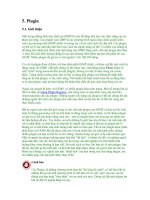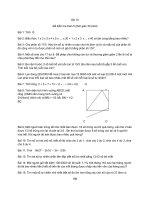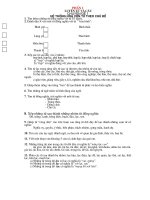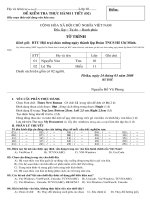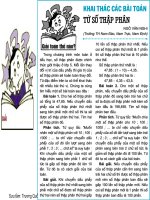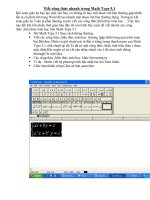- Trang chủ >>
- Mầm non - Tiểu học >>
- Lớp 5
5 1 1 learning from ms liang
Bạn đang xem bản rút gọn của tài liệu. Xem và tải ngay bản đầy đủ của tài liệu tại đây (4.64 MB, 14 trang )
Suggested levels for Guided Reading, DRA,™
Lexile,® and Reading Recovery™ are provided
in the Pearson Scott Foresman Leveling Guide.
Learning from
Ms. Liang
by Juna Loch
Genre
Realistic
fiction
Comprehension
Skills and Strategy
• Character and Plot
• Author’s Purpose
• Prior Knowledge
Scott Foresman Reading Street 5.1.1
ISBN 0-328-13503-8
ì<(sk$m)=bdfadf< +^-Ä-U-Ä-U
illustrated by K. E. Lewis
Reader Response
Learning from
Ms. Liang
1. How did the narrator change in a way that made her able
to think about her classmates differently?
2. What did you know about Emily Dickinson before reading
this story? What did you learn as you read? What more
would you still like to know about her? Make a chart like
the one below and list what you now know about Emily
Dickinson and what more you want to know.
What We Know
What We Want to Know
3. Four of the vocabulary words in this book—acquainted,
expanded, guaranteed, and worshipped—are verbs that
have been changed to end in -ed. What are the base words
of these verbs? Use two of them in sentences.
4. If you were Ms. Liang, would you have felt comfortable
telling the class that you had once felt like a “nobody”?
Why or why not?
by Juna Loch
illustrated by K. E. Lewis
Editorial Offices: Glenview, Illinois • Parsippany, New Jersey • New York, New York
Sales Offices: Needham, Massachusetts • Duluth, Georgia • Glenview, Illinois
Coppell, Texas • Ontario, California • Mesa, Arizona
On Tuesday, we found out that we were getting a
new teacher. The rumor was that our old teacher, Mr.
Williams, had gotten sick.
Our new teacher was supposed to start Wednesday.
Wednesday arrived, but the new teacher was late. We
didn’t mind. The whole class was sitting around and
talking excitedly about the upcoming fifth-grade chorus
concert. The girls were getting new dresses. The boys
were going to wear suits.
Everyone was talking about it, except Lisa Linney.
She just sat at her desk, her long hair hiding her face.
Everyone knew that she didn’t have enough money to
buy a new dress. We would often talk about Lisa in front
of her. People didn’t try to be mean. It was just that
it was easy to forget she was there. In a way, Lisa was
invisible.
Every effort has been made to secure permission and provide appropriate credit for
photographic material. The publisher deeply regrets any omission and pledges to
correct errors called to its attention in subsequent editions.
Unless otherwise acknowledged, all photographs are the property of Scott Foresman,
a division of Pearson Education.
Illustrations by K.E. Lewis
Photograph 24 Library of Congress
ISBN: 0-328-13503-8
Copyright © Pearson Education, Inc.
All Rights Reserved. Printed in the United States of America. This publication is
protected by Copyright, and permission should be obtained from the publisher
prior to any prohibited reproduction, storage in a retrieval system, or transmission
in any form by any means, electronic, mechanical, photocopying, recording, or
likewise. For information regarding permission(s), write to: Permissions Department,
Scott Foresman, 1900 East Lake Avenue, Glenview, Illinois 60025.
2 3 4 5 6 7 8 9 10 V0G1 14 13 12 11 10 09 08 07 06 05
3
The new teacher finally walked in. She wasn’t all that
remarkable looking, and her clothes were kind of plain.
But as soon as she came in everyone stopped talking.
With just a glance around the room she made you want
to pay attention. Even the noisy kids who sat in the back
fell silent as she walked up to the blackboard.
What’s the first thing a new teacher does? She takes
attendance, or writes her name on the board, right? But
this new teacher didn’t do that. Instead, she picked up
the chalk and wrote out a poem.
I’m nobody! Who are you?
Are you nobody, too?
Then there’s a pair of us—don’t tell!
They’d banish us, you know.
How dreary to be somebody!
How public, like a frog
To tell your name the livelong day
To an admiring bog!
4
“Good morning, class. My name is Ms. Liang,” the new
teacher said. She picked up a copy of the book we were
reading. “Can someone tell me where you stopped last?”
I looked around the classroom, wondering who was
going to answer. Then A.J., who always liked to challenge
teachers, asked, “Aren’t you supposed to learn our names
before you make us work?”
Ms. Liang answered, “I’m sure we’ll get plenty
acquainted as time goes by. And, as a way of getting
to know my students, I’ve always preferred reading
together instead of just going around memorizing
names. But since you were nice enough to speak up,
maybe you could start reading out loud from where you
left off?”
A.J. muttered, “I knew this would happen,” and
began reading.
Ms. Liang stopped him after only a couple of
sentences. “No, no,” she said. “Not like that. You’ve got
to place yourself in the story. You’ve got to make it come
alive for you and everyone else. Read as if you’re telling
your story.”
A.J. looked puzzled. “What do you mean, my story?”
5
“What I mean is, read as if the book were about you.
Read as if you knew everyone wanted to hear the story
of your life. Imagine that you would burst if you couldn’t
share your story with the class.”
None of us had any idea what she was talking about.
Then, just out of curiosity, I looked over at Lisa. It looked
like she knew exactly what Ms. Liang was talking about.
“It is essential to read with feeling,” Ms. Liang went
on. “If you read with feeling, it’s guaranteed to be more
interesting to the people who are listening. And it will be
more interesting to you.”
6
“Why?” my friend Mary Alice asked.
“Because it’s a scientific fact that your face affects
your emotions,” Ms. Liang answered.
“What’s that supposed to mean?” A.J. suddenly
blurted out. I could tell that he was annoyed because Ms.
Liang hadn’t gone over our names.
Ms. Liang explained, “Scientists have discovered that
facial expressions influence people’s emotions. When
you make an angry face, your brain floods your body
with chemicals that actually make you feel angry. So if
you read with feeling, you will have a better chance of
experiencing the characters’ own feelings. Does that
make better sense?”
Ms. Liang then called on Lisa to continue reading.
As soon as Lisa began reading, I thought, she’s
acquainted with these feelings for sure. But, as well as
she read, her quietness made it difficult to understand
her. Ms. Liang stopped her when she saw that people
were having a hard time hearing her.
“What’s your name?” Ms. Liang asked.
“Lisa Linney,” was the mumbled reply.
“All right, Lisa,” said Ms. Liang. “I want you to keep
reading as you’ve been doing, with all that great feeling.
But this time, read a little louder.”
7
Lisa resumed her reading. Her words were full of
feeling. Still, she wasn’t loud enough. I realized that Lisa’s
quietness made people forget about her more easily.
While Lisa read, Ms. Liang stood by her desk, listening
carefully. Lisa blushed in reaction to Ms. Liang’s close
presence.
After a while, Ms. Liang stopped Lisa. Turning to face
the class, she asked, “Did you get that? The character Lisa
was reading about said, ‘You never understand someone
until you walk around in their skin.’ What did that
character mean?”
It’s funny. If Mr. Williams had said the words “walk
around in their skin,” someone would have said “Eeew,
that’s gross,” or made a joke. But everyone was quiet. We
could tell how much Ms. Liang cared about her teaching,
and nobody wanted to make trouble.
We talked about the meaning of those words for a
couple of minutes. Then Ms. Liang told us to take out a
piece of paper.
“Here’s your assignment,” she said. “You’re going to
find this difficult, but it’s important that you understand
this concept. I want you to write down what people
would understand about you if they could walk around
in your skin.”
8
9
“What do you mean?” asked A.J.
“I’m sure there’s been a time you’ve felt
misunderstood,” Ms. Liang explained. “So here’s the
question. Would the rest of the world understand you
better if they knew what it was like to be you? That’s
what I mean. Does that make sense?”
The class nodded together.
“Good!” Ms. Liang said. “Then go ahead and start
writing. Oh, and make sure not to sign your names.”
I took out my paper and stared at it. Then I looked
up at the poem on the chalkboard. I didn’t know what
to write. What didn’t people know about me? I thought.
Everyone knows everything there is to know. I’m me. I’m
popular. I do okay. I have a reputation for nice clothes.
What else would anyone need to know?
10
Lisa was sitting in the desk to the right of me, writing
quickly. I tried to peek at what she had written, but
it was difficult. She had her whole body shielding the
paper, as if her words were top secret.
A few minutes went by. Still, I couldn’t find anything to
write about. Then I heard A.J. in the back, making some
mean remark about Lisa. It made me think about the times
he’s said mean things to me. Then I thought about the
time Katie Lee Clinton and her friends had stopped talking
and laughed when I came into the classroom. That had
definitely made me feel like a nobody.
I looked back up at the words on the chalkboard:
I’m nobody! Who are you? No doubt, I felt like that
sometimes. There were many times when I felt like my
class was filled with people who had no idea who I
was. Usually that feeling disappeared after a couple of
moments. But still, I knew what it was like.
11
After we wrote for ten minutes, Ms. Liang collected
our papers. A.J. had questions as usual.
“What’s the deal with that poem?” he asked. “And
why didn’t you want us to sign our names?”
“I just thought you might find the poem interesting,”
Ms. Liang told him. “As for not signing your name, I use
procedures like that to protect students’ feelings. Some
of the students might have felt embarrassed if I knew
who had written what.”
The rest of the day went by slowly. Ms. Liang went
over our math and science homework. Finally, the bell
rang for us to go home. As I walked out of class, an
incredible thought occurred to me: We had shared more
with Ms. Liang in one day than we had with Mr. Williams
in a whole year!
My thoughts inspired me to start writing. “I know that,
at times, I’ve felt like the person talking in the poem. Does
anyone else feel that way? Do other people in the class
ever feel like they’ve been forgotten?” I wrote.
I wrote about how those feelings were worst on days
when I felt sad. Everyone’s had those days. They’re the
days when your mother yells at you before school, or
your best friend says something really mean. They’re the
days when you do poorly on a test. Like I said, everyone’s
had those days.
I wrote, “If people really knew me, if people
could walk around in my skin and feel lonely like I
do sometimes, they wouldn’t say I was stuck up or
standoffish. One day, Katie Lee Clinton told me that I was
both of those two things. It made me feel like a nobody.”
12
13
The next day the poem was back on the chalkboard. I
knew it wasn’t left over from the day before, because this
time it was written in a different color chalk.
“Why do you keep writing that poem on the board?”
A.J. asked Ms. Liang.
Ms. Liang answered, “As I told you yesterday, I find it
interesting.” She continued, “Now take out your assigned
reading, please. Did everyone finish chapter five?”
I raised my hand. “This isn’t about chapter five, but …
did you read what we wrote yesterday?” I asked.
Ms. Liang laid down her book.
“I did,” she answered.
“And what did you think?” I was incredibly curious.
14
After a long pause, Ms. Liang answered, “What you
wrote tells me that you all have a lot to learn about each
other. It tells me that there are a lot of people in this class
who feel like their classmates don’t understand them at
all. It’s important that you learn more about how your
classmates feel. Once you do, you’ll find that you’ll be
treating each other better.”
“What do you mean?” Mary Alice asked defensively.
“Are you saying that we’re mean? Are you saying that we
don’t treat each other well enough in the first place?”
Ms. Liang smiled. “I’m saying that all of us are mean
sometimes, without even realizing it.”
Mary Alice made a face. “You think that if we really
knew each other, we would like each other more? I know
a lot of people. I don’t like them any better than other
people just because I know them.”
15
I had a hard time with the assignment. I wanted to
write about A.J. because he’d been mean to me. But I
had no idea why he’d been mean, so I couldn’t get inside
his skin, like Ms. Liang wanted us to. Then I remembered
the time when I had been mean to someone, like A.J. had
been mean to me.
Mary Alice and I had been standing in the school
hallway. We had been talking about Lisa’s clothes and
laughing at them. Right then, Lisa came around the
corner. She had heard everything we said. It was awful.
Lisa turned pale, and ran away.
Mary Alice and I just kept laughing. I don’t know why
I laughed at Lisa’s clothes. I don’t know why I didn’t say
anything to try to make her feel better so she wouldn’t
have run away. The memory of that time made me feel so
bad that I couldn’t make myself write anything.
“You might not like the person better,” Ms. Liang
answered, “but you might dislike the person less.
Understanding people does not excuse whatever poor
actions they may take. But the more you understand
them, the more you might appreciate why they do what
they do. It might even make you see things from their
point of view, as if you were in their skin.”
Ms. Liang then told us our homework assignment for
that night. This time, she wanted us to sign our names
because she was going to grade what we wrote. She
wanted us to write a paragraph about trying to get inside
the skin of someone we didn’t like. To protect people’s
feelings, she didn’t want us to use anyone’s real name.
16
17
The next day, everyone was talking about the fifthgrade chorus concert again. Like last time, the girls were
talking about the fancy dresses their mothers were going
to buy for them. Of course, Lisa wasn’t part of those
conversations. But I noticed that she had stopped hiding
and pretending she wasn’t there. Instead, she was sitting
up straight, with her homework on her desk, waiting for
Ms. Liang to arrive.
I was waiting too. I wanted Ms. Liang to come in and
tell us what the poem meant. When she came in, I asked.
“It’s a poem by Emily Dickinson,” she answered.
“But what is it? I mean, what does it mean?”
Ms. Liang thought for a minute before answering.
“Well, what do you think it means?” she finally asked us.
18
Nobody answered at first.
“Well,” she prompted, “which would you rather
be—a somebody or a nobody?”
A somebody, we all said. “Who wants to be a
nobody?” A.J. added.
“Of course,” said Ms. Liang. “But how does the poet
talk about somebodies?”
That was when Lisa raised her hand. In the past she
had always been too shy, but now her hand was high in
the air.
“The poem says that somebodies are like frogs,” she
said. “Frogs that sit around all day doing nothing but
boasting.”
“Is she really talking about frogs?” Ms. Liang asked.
“No,” Lisa continued. “She means that people who
are full of themselves are as silly as frogs. Their talk is just
like ribbeting. Because of that, Emily Dickinson is proud
to be a nobody.”
19
How could you be proud to be a nobody? We didn’t
understand. But Lisa Linney, our own sort of nobody, did
understand. She looked at Ms. Liang like she worshipped
her. Ms. Liang smiled back. It was just like the poem. Ms.
Liang’s face seemed to say, “Hey, Lisa, do you want to be
a nobody with me?”
“You know,” Ms. Liang said, looking right at Lisa, “we
are all somebodies, though too often the world forgets
it.” She sighed. “When we treat other people like they
are nobodies, we hurt them.”
The room became very quiet after Ms. Liang said that.
“I bet no one ever treated you like a nobody,” Mary Alice
said, breaking the silence.
20
Ms. Liang sighed and looked sad. “When I was your
age, I was a nobody,” she told us. “There’s no way I could
have been anything but a nobody. I didn’t fit in. Because
my family was poor, I didn’t have any of the toys or
clothes that the other children cared about. My clothes
were old, and I didn’t have the money to go places with
the other kids. Of course, it didn’t really matter, because I
was a nobody in the first place. So no one ever asked me
to go anywhere with them.”
Ms. Liang looked directly at Lisa. “I know what it’s like
to be around people who act like those proud frogs. The
other students would talk about parties I hadn’t been
invited to. They’d talk as if I weren’t there. So by the time
I got to high school, I decided not to be there. I dropped
out. What did I need school for? In my mind, all I needed
was money. If I had money, I thought it would hide the
fact that I was a nobody. The worst part was, I was so
invisible that no one even noticed I had dropped out.”
Ms. Liang stared out the window. No one said a word.
21
“It was the dumbest thing I’ve ever done,” Ms. Liang
said. “After dropping out, I worked ten years. Still, I was
treated like a nobody. I would look at my future, and all I
could see was more of the same.”
Ms. Liang’s tone suddenly brightened. “But then I
started working for a nice lady. To my shock, she liked
me. She refused to let me throw my life away. ‘Go back
to school,’ she told me. I never would have gone back
without her encouragement.”
She went on, “I had to work two jobs to make enough
money to live on. I studied whenever I could find the
time. It wasn’t easy. I often found myself behind in my
studies. All I could think about was how much easier it
would have been if I’d stayed in school.”
22
Ms. Liang’s tone was now triumphant. “But that
woman believed in me and encouraged me. She forced
me to see myself as a somebody. She taught me that
Dickinson poem. As soon as I heard the poem, I knew I
didn’t need money to be somebody. I knew then that I
wanted to be a teacher, and a good one. I knew I would
run into students who thought they were nobodies.
When I met them I could be a good teacher and tell
them, ‘I thought I was nobody too! Tell me about
yourself, and I’ll prove that you’re not a nobody.’”
Everyone in the room was looking at Lisa,
remembering times they had been mean to her. We all
felt like nobodies for the way we had treated her. Now,
because of Ms. Liang, we knew that Lisa was a somebody.
23
Emily Dickinson
Reader Response
Many people like to spend time by themselves. But
there are some people who withdraw entirely from
society. One such person was Emily Dickinson.
Emily, the daughter of a Massachusetts politician,
came from a wealthy family. In 1848, at age eighteen, she
came home from what is now Mount Holyoke College,
complaining of homesickness. From that point on, she
seldom left her parents’ home. Emily rarely saw visitors.
Instead, she read, wrote letters, and composed over two
thousand poems.
You might think that someone who never left home
would have nothing to write about. But Emily did.
Looking at only the things in her house, she gained new
insight into life’s great themes. “Tell all the truth, but
tell it slant,” she wrote. And that is what she did. In her
private world, Emily Dickinson managed to “see” more
than some of the most adventurous world travelers.
1. How did the narrator change in a way that made her able
to think about her classmates differently?
2. What did you know about Emily Dickinson before reading
this story? What did you learn as you read? What more
would you still like to know about her? Make a chart like
the one below and list what you now know about Emily
Dickinson and what more you want to know.
What We Know
What We Want to Know
3. Four of the vocabulary words in this book—acquainted,
expanded, guaranteed, and worshipped—are verbs that
have been changed to end in -ed. What are the base words
of these verbs? Use two of them in sentences.
4. If you were Ms. Liang, would you have felt comfortable
telling the class that you had once felt like a “nobody”?
Why or why not?
24
